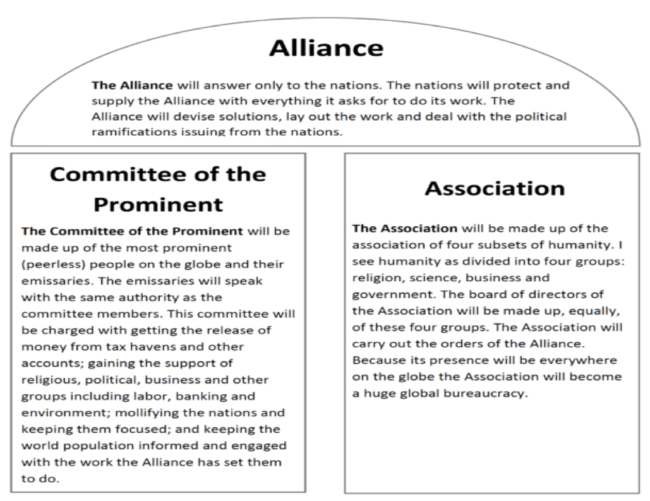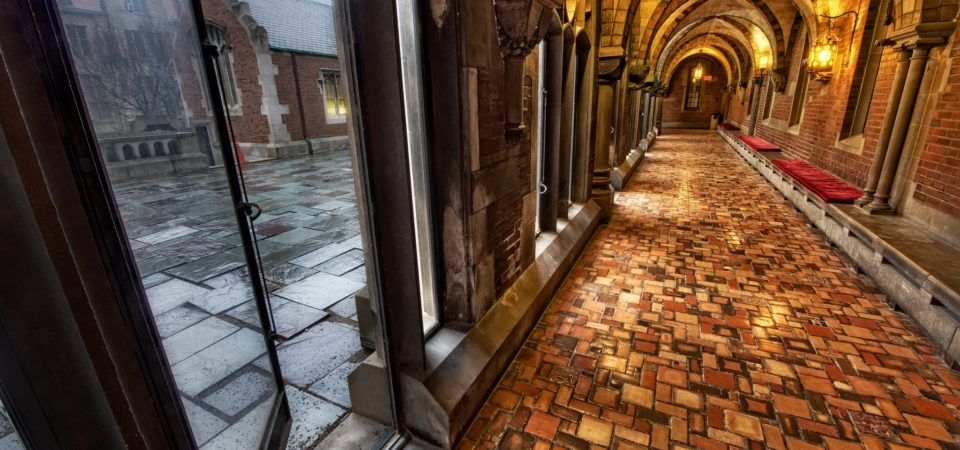Arnold Byron has previously written about his Plan for the Nations in the MAHB blog. Step Four is a synthesis of these posts and a call to action for how we may ignite this plan.
In the beginning plants and animals of every kind were already on the scene. The atmosphere had been cleaned of excess greenhouse gases, the land was rich in nutrients and the waters were abundant above and below ground. The first humans came into a veritable Garden of Eden. There was no reason to limit population growth so the population grew, now there are more than 7.5 billion people and diminishing resources. Now we are in trouble.
In its march into the future humanity has come to a fork in the road. Shall humanity continue on its current path or shall we turn onto the fork? I want to thank Mr. Geoffrey Holland for his article, The End Game for a Truly Planetary Society. In his article Mr. Holland writes, “The path to a future that is sustainable and life-affirming will be built on a profound reshaping of the way we humans organize ourselves. Exactly what that remaking will look like would be an educated guess at this point.”
I hope that Mr. Holland will concur that we have indeed come to a fork in the road and that, somehow, a decision must be made to lead humanity onto the new road. Who will make that decision? Our leaders, of course. The question is: How do we make these leaders decide that changing the direction of humanity will be better than forging blindly ahead? They need to be shown a plan. One that they can buy into.
Mr. Holland calls for a future built on a profound reshaping of the way we humans organize ourselves. This means that we need to find answers to real questions. For instance. What is the quickest and best way to reach negative population growth? Where will the money to put solar panels on every building in the world come from? If we decide to stop using fossil fuels, how will we get the petroleum products we will need as we transition to renewable solar?
Who will make decisions about questions like these. Should changes be made in a willy-nilly fashion or should there be a plan?
I have outlined my Plan for the Nations in previous MAHB blog posts. These articles are based on my book, Of Population and Pollution- A Global Warming Primer. Global warming, overpopulation and other planetary crises will only be resolved when the leaders of the nations create a global office and give that office the authority to do what is necessary.
What will this global office look like?

The Alliance is the name I have given this global office. It will be given the authority to solve global warming and related problems. It will be comprised of twelve elected scholars, all from colleges or universities: six from science departments and six from comparative religion. Why educational leadership? I want the twelve committee members to be intelligent and capable; they must not have sociopathic tendencies or special interest agendas. Candidates from science and comparative religion departments fit the above criteria.
The Alliance will have two committees. These committees will answer to The Alliance only. It is important to note that the Alliance and subcommittees could be established prior to the nations formalizing them into a global office. Doing so would give The Alliance and subcommittees an opportunity to argue their potential efficacy.
The Committee of the Prominent will be made up of the most prominent people in the world. Members will be appointed by The Alliance. A number of emissaries, who will stand in when the committee member is not available, will be appointed to each member. The committee will serve The Alliance by educating leaders and citizens in all nations about the issues, by promoting the importance of creating a global office, and by engaging banks, oligarchs and insurance companies about money and other resources that will be needed.
The Association will be comprised of twelve elected members who will be responsible for carrying out the orders and policies made by The Alliance. For example, the Association will be responsible for overseeing the development of infrastructure to meet the goals of using only renewable energy sources and removing carbon from the atmosphere. Efforts to end global warming will require offices around the world. Elected members must have knowledge and skills in business, engineering, government and human relations. I have laid out the election procedures here, in chapter 12 of my book. Term limits and other rules will be drafted to circumscribe the committee and its work.
Who will make this happen?
Colleges and universities are the repositories of our intellect and creativity, I envision them having the foresight to pull this together. It will require changes to laws and regulations. Educational law departments across the globe should step up to write the treaties, charters, constitutions and laws needed for this plan. I suggest these agreements be nonbinding until a majority or supermajority of nations agree.
University presidents and boards of regents must begin the process by forming a worldwide association of colleges and universities. Students: the future is yours. You may have to start agitating in your colleges and universities to wake up your elders.
To those out there in the blogosphere: How can you and I reach out to the regents, the presidents and the department heads of our colleges and universities, worldwide? It is up to us to encourage the college leaders to push the political leaders. Political leaders will listen to a board of regents. Once a few universities announce they agree, the number will increase quickly.
Conclusions
I am convinced that we need a global office in charge of our efforts. So far, no real progress on a global scale has resulted from humanity’s efforts because there has been no coordinated effort. A Plan for the Nations will work if everybody wants it to work.
I would be very happy to leave this up to the United Nations to do. But, the United Nations cannot do it, the security council veto will allow special interest agendas to interfere. When the nations are ready to approve a global office the nations will be prudent to establish an advisory group. The United Nations could be included in this group.
Many people have ideas. They should all be considered.
If the nations adopt this plan, then twelve people will have the authority to decide how humanity will be reshaped. They will need ideas from everywhere. Our ideas will finally be seen by an actionable authority.
Arnold Byron is a retired United States Customs Inspector who, in his retirement, has worked for legalizing marijuana. He was born in 1941 in the upper Midwest. While living and working near the Canadian Border, he saw how winters were growing warmer over time. By 2014 he decided to write his thoughts into a book titled Of Population and Pollution –A Global Warming Primer. He joined MAHB in 2016.
The MAHB Blog is a venture of the Millennium Alliance for Humanity and the Biosphere. Questions should be directed to joan@mahbonline.org
The views and opinions expressed through the MAHB Website are those of the contributing authors and do not necessarily reflect an official position of the MAHB. The MAHB aims to share a range of perspectives and welcomes the discussions that they prompt.
